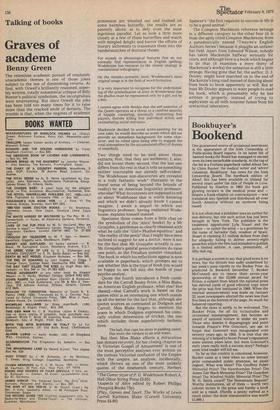Bookbuyer's
Bookend
One guaranteed source of occasional merriment is the appearance of the Irish Censorship of Publications Board reports. In its latest list of banned books the Board has managed to exceed even its own remarkable standards. At the top of the list is a Fontana paperback called About Sex by Claire Rayner, the medical writer and 'advice' columnist. Bookbuyer has news for the Irish Censorship ,.Board. The hardback edition of About Sex has been available in Ireland for several years under the title of People in Love. Published by Hamlyn in 1968 the book got glowing reviews in the medical press and – despite a frank chapter on contraception – was translated into Spanish and distributed all over South America without an eyebrow being
raised. • It is not often that a publisher sues an author for non-delivery, but one such action has just been brought in 'New York. The publisher is the exuberant opportunist Lyle Stuart and the author – or rather the artist – is a gentleman by the name of Salvador Dali, resident of Spain. Stuart is claiming 2.1 million dollars from Dali for allegedly failing to deliver seventy-eight gouaches which the firm had intended to publish in a limited edition. A case, presumably, of dilly-dali-ing.
It is perhaps a truism to say that good news is no news, but the dictum was sadly underlined by last week's press reports on the Booker Prize. As predicted in Bookend December 7, Booker McConnell are to renew their seven-year sponsorship of the £5,000 annual award for fiction, a subject from which the national press has derived yards of good editorial copy since the prize was first instituted in 1968. When the renewal announcement was made on January 22, most newspapers allotted the news less than five lines at the bottom of the page. So much for balanced reporting.
But the news is surely to be welcomed. The Booker Prize, for all its vicissitudes and occasional mismanagement, has become an award of national stature in under six years. Those who dismiss it disparagingly and point towards France's Prix Goncourt, are apt to forget that Goncourt was inaugurated over seventy years ago, in 1903. It is true that the winning of it helped to boost Proust's reputation some sixteen years later, but were Goncourt's early years really such a success story? Perhaps some kind reader will tell me.
So far as this country is concerned, however, Booker came at a time when no other literary prize commanded public attention, let alone respect. What was there? The Geoffrey Faber Memorial Prize? The Hawthornden Prize? The James Tait Black Memorial Prize? The Guardian Prize? The Winifred Holtby Memorial Prize? The W. H. Smith award? The Heinemann Bequest? Worthy institutions, all of them – worth two column inches in the press and hardly a book sold as a result. (Hardly a penny earned as a result either: the most remunerative was worth £1,000.)


































 Previous page
Previous page